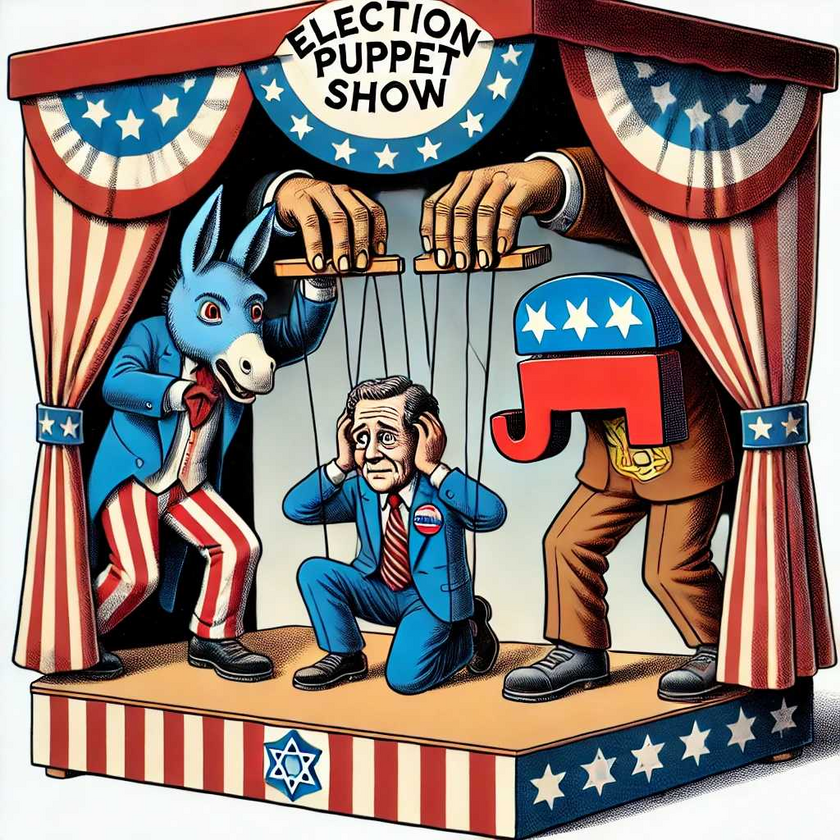Dollars for Democracy: The Zionist Version of Inverted Totalitarianism
Note: Due to content length requirements, this essay is presented in two parts.
Part I
Introduction
In modern American politics, concerns have grown regarding the health of democratic institutions and the influence of powerful interest groups. One framework that helps explain this phenomenon is "inverted totalitarianism," a term coined by political philosopher Sheldon S. Wolin. This essay explores how the influence of Zionist lobby groups aligns with the concept of inverted totalitarianism, potentially affecting U.S. democracy and mainstream media. By examining case studies and incorporating the perspectives of scholars like John Mearsheimer, Norman Finkelstein, and Noam Chomsky, we aim to understand the mechanisms that may threaten democratic principles.
Inverted Totalitarianism: Origin and Definition
Sheldon S. Wolin introduced the concept of inverted totalitarianism in his book Democracy Incorporated: Managed Democracy and the Specter of Inverted Totalitarianism (2008). Unlike classical totalitarian regimes that openly exert power through a charismatic leader and centralized authority, inverted totalitarianism functions within a democratic framework, subtly eroding democratic institutions from within. It is characterized by the dominance of corporate and elite interests, leading to a managed democracy that maintains the façade of democratic symbols and rhetoric while serving a select few.
This system manipulates public opinion, marginalizes dissenting voices, and controls information to maintain its power. Citizens participate in democratic processes, but their influence on policy is minimal. This framework helps explain how lobby groups can align U.S. policy with specific interests despite differing public opinions.
The Influence of Zionist Lobby Groups on U.S. Democracy and Media
The influence of Zionist lobby groups on U.S. foreign policy and media narratives has been extensively debated. Critics argue that these groups prioritize a foreign nation's interests over America's, potentially undermining democratic processes.
John Mearsheimer and Stephen Walt, in The Israel Lobby and U.S. Foreign Policy (2007), argue that certain lobby groups exert significant influence on U.S. foreign policy, particularly in the Middle East. They contend that these lobbies shape policy through political pressure and manipulation of public discourse, often steering the U.S. in directions that benefit Israel at the expense of its own national interests.
Norman Finkelstein, in Knowing Too Much: Why the American Jewish Romance with Israel Is Coming to an End (2012), discusses how suppression of dissenting voices and control of media narratives can stifle criticism of Israeli policies. He highlights efforts by lobby groups to maintain unchallenged stances in mainstream media, marginalizing alternative perspectives.
Noam Chomsky's concept of "manufacturing consent," co-authored with Edward S. Herman in Manufacturing Consent: The Political Economy of the Mass Media (1988), provides a framework for understanding how media serves elite interests. Chomsky argues that mass media outlets propagate government and corporate agendas, limiting acceptable discourse and ensuring dissent remains outside mainstream coverage. This is evident in controlled narratives around Israel and Palestine, where Zionist lobby groups leverage their influence to promote favorable depictions and suppress opposing views.
Historical Context: Media Manipulation and Public Opinion
Manipulating public opinion through media has historical roots. Edward Bernays, considered the father of public relations, demonstrated how media could shape public perception on a mass scale. His work during World War I showcased techniques for influencing opinion through emotional appeals and information framing.
The era of yellow journalism in the late 19th and early 20th centuries exemplifies how sensationalism and biased reporting swayed public sentiment. This period coincided with the rise of the Zionist movement, which aimed to establish a Jewish homeland in Palestine. Media played a crucial role in garnering support for Zionist objectives, often simplifying complex geopolitical issues and framing narratives to align with Zionist goals.
End of part 1
















